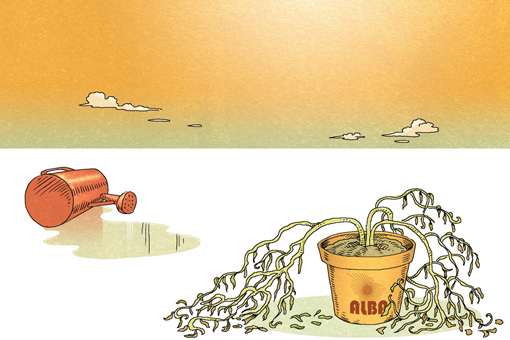ALBA was created by the late Venezuelan President Hugo Chávez in 2004 to serve as a grand and high-profile rejection of the United States–proposed Free Trade Area of the Americas (FTAA) and, more generally, of international capitalism. Instead of basing trade on supply and demand, ALBA countries would use social consciousness and human rights as their criteria, with the aim of ushering in a new era of hemispheric harmony. ALBA currently has eight full members and two guest members.
Whether ALBA will continue to exist in any meaningful way now that Chávez is no longer leading it depends on the incentives of chavistas at home and member states abroad to remain committed. Even if the chavistas hold on to power through Chavez’ designated successor, Nicolás Maduro, the outlook for ALBA is not good.
ALBA was an important component of a strategy aimed at fostering broad Latin American and Caribbean cooperation while consciously excluding the United States. In theory, it would bring to fruition Simon Bolívar’s long-standing dream of regional unity, at least as Hugo Chávez envisioned it. A key unifying factor would be the member governments’ common stance against U.S. imperialism. As its founding declaration puts it, the alliance is based on solidarity “without egoist nationalisms.”
That is a tall order. Rejecting nationalism means that states act without regard, or at least with minimal regard, for their own interests—and without much concern for domestic public opinion. It’s hard to find any state in the world that has successfully operated in such a way, and none of the ALBA member states has a long history of cooperation.
Participation in ALBA requires that member governments accept both the alliance’s ideological stance and—presumably even post-Chávez—Venezuela’s domination of it. That is simply not realistic. Honduras joined in 2008 under President José Manuel Zelaya and then left in 2010 after he was deposed and replaced by a more conservative president. Any shift toward the political Right in member countries will likely entail leaving ALBA.
In practice, ALBA is far less grand than its rhetoric. It has primarily been held together by oil funneled by Chávez to small countries at preferential terms in exchange for political support. Venezuela has exchanged roughly $12 billion in oil in this manner. If this arrangement were terminated and oil were sold at market rates, there would be little incentive for current member states to continue participating.
Grand or not, ALBA cannot function without a long-standing commitment by the Venezuelan government to fund its activities. Without much of an actual agenda, ALBA’s longevity will depend on both the will of the Venezuelan president and the strength of the Venezuelan economy. Other potential replacements, like Ecuador’s Rafael Correa, have shown little interest in taking on the mantle, and even if Correa did want to, he lacks the petroleum reserves that allowed Venezuela to bankroll the alliance.
So, with Nicolás Maduro as president, Venezuela’s support for ALBA is temporarily assured. But without Chávez’ authority and micromanagement to hold the disparate elements of his movement together—ranging from the military and community groups to leftist parties—splinters have already started to form. Competing chavista factions will not necessarily support providing handouts to other countries; in fact, many future leaders will be more interested in using shrinking resources to consolidate power instead.
The economy will play a critical role in these political calculations. In February 2013, the government devalued the bolívar 32 percent against the dollar, reflecting serious economic problems.
The devaluation was intended to provide the government with more bolívares for the dollars it brings in from oil. Yet it also has an adverse effect on the poor, who now face higher prices for imports, including basic foodstuffs. Even before the devaluation occured, Caracas was the most expensive city in the Americas and the ninth-most expensive in the world.
Add to this the fact that the country is already suffering from high inflation, a soaring homicide rate and a large black market for dollars. These affect the daily lives of all Venezuelans. Forging policies to solve those problems will be a priority for Maduro.
In a 2011 letter to the United Nations, Chávez wrote that ALBA “advances as an avant-garde experiment of progressive and anti-imperialist governments, seeking ways to break the prevailing international order.” The avant-garde, however, will inevitably bow to political and economic realities. Impending economic troubles will make Venezuelans less keen on footing the bill for any alteration of the international order.
Given the realities of the domestic economy and the difficulties of transferring charisma from one leader to the next, Maduro will not enjoy the political capital necessary at home to follow the same ambitious path as his predecessor.
With a high probability of flagging enthusiasm for ALBA both at home and abroad, and without Hugo Chávez’ guidance, there is little reason to believe it will continue in any consequential manner in the late president’s absence.





